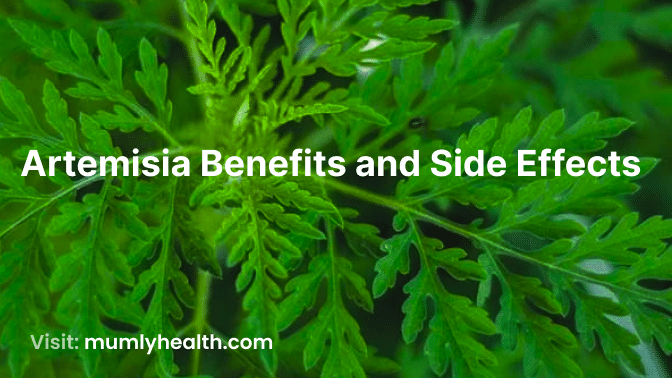Artemisia, a genus of flowering plants, has a rich history of use in various cultures for its medicinal properties. From ancient remedies to modern research, Artemisia has garnered attention for its potential health benefits.
In this article, we will delve into the benefits of Artemisia supported by scientific studies, as well as its possible side effects and precautions to consider.
Benefits of Artemisia
- Antimicrobial and Antiparasitic Properties: Artemisia has shown effectiveness against various microbes, including bacteria, fungi, and parasites, making it useful in combating infections.
- Anti-inflammatory and Immunomodulatory Effects: Artemisia exhibits anti-inflammatory properties and has the potential to modulate the immune system, which can be beneficial for managing inflammatory conditions.
- Digestive Health and Anti-ulcer Properties: Artemisia may aid in digestive health by soothing the digestive system and protecting against ulcers.
- Antioxidant Activity: The herb possesses antioxidant properties, helping to neutralize harmful free radicals and reduce oxidative stress in the body.
- Potential Anti-cancer Effects: Certain compounds found in Artemisia, such as artemisinin, have shown potential anti-cancer activity by inhibiting the growth of cancer cells and promoting apoptosis (programmed cell death).
- Malaria Treatment: Artemisinin, derived from Artemisia annua, is a key component in the treatment of malaria, particularly for drug-resistant strains.
- Traditional Uses: Artemisia has been used in traditional medicine for centuries to address various ailments, including fevers, digestive disorders, and skin conditions.
- Potential Digestive Aid: Artemisia has been traditionally used to alleviate symptoms of indigestion, bloating, and gastrointestinal discomfort.
- Anti-allergic Effects: Some studies suggest that Artemisia may have anti-allergic properties, potentially helping to reduce symptoms associated with allergies.
- Potential Anti-diabetic Effects: Preliminary research indicates that Artemisia may have anti-diabetic properties, contributing to improved blood sugar control.
It is important to note that while there is scientific evidence supporting some of these benefits, further research is needed to fully understand the mechanisms and effectiveness of Artemisia in various health conditions.
Artemisia in Traditional Chinese Medicine and Ayurveda
Artemisia holds a prominent place in traditional Chinese medicine (TCM) and Ayurveda. In TCM, Artemisia species like Qing Hao (Artemisia annua) are used for their cooling and fever-reducing properties. Ayurveda recognizes Artemisia species like Davana (Artemisia pallens) for their medicinal value in treating various conditions.
Read Also: Plant to repel snakes
Side Effects and Precautions
Artemisia may be best avoided by vulnerable groups and those who have particular medical issues. These circumstances include:
- Potential Allergic Reactions and Sensitivities: While rare, some individuals may experience allergic reactions to Artemisia. Symptoms can include skin rashes, itching, or respiratory distress. It’s important to be aware of these potential reactions, especially if you have a history of allergies.
- Interactions with Medications or Other Herbs: Artemisia may interact with certain medications or other herbs, potentially affecting their effectiveness or causing adverse effects. Consult with a healthcare professional before combining Artemisia with other medications or herbs.
- Effects on Pregnancy and Breastfeeding: Pregnant or breastfeeding women should exercise caution when considering Artemisia. Some species of Artemisia may have uterine stimulant effects, which can be risky during pregnancy. It is essential to consult with a healthcare provider before using Artemisia during these stages.
- Safety Concerns and Dosage Recommendations: While Artemisia is generally safe when used appropriately, excessive or prolonged use may pose risks. It is advisable to follow recommended dosage guidelines and consult with a healthcare professional before starting any new herbal regimen.
- Impact on Liver or Kidney Function: Individuals with pre-existing liver or kidney conditions should exercise caution when using Artemisia. Some studies suggest potential hepatotoxicity with high doses or prolonged use. If you have liver or kidney issues, it is crucial to consult with a healthcare professional before incorporating Artemisia into your healthcare routine.
- Risks Associated with Long-Term Use: Long-term use of Artemisia may carry certain risks and considerations. It is advisable to use it for a specific duration as recommended and periodically evaluate its usage under the guidance of a healthcare professional.
- Considerations for Specific Populations: Different populations may have varying sensitivities and reactions to Artemisia. Children, the elderly, and individuals with certain health conditions should exercise caution and seek professional advice before using Artemisia.
Artemisia taken in large doses has the potential to cause seizures, kidney failure, nausea, and vomiting. If you take it in modest dosages, like those found in tea, you’re less likely to have these negative effects. Although the lethal dosage of this plant in humans has not been determined, very high doses and other thujone-containing items may be deadly.
Availability and Forms of Artemisia Products
Artemisia is available in various forms, including teas, supplements, and essential oils. Understanding the different forms and their applications can aid in selecting the most suitable option for your needs.
Conclusion
Artemisia, with its rich historical background and promising medicinal properties, presents a fascinating subject of study. While the herb offers potential health benefits, it is essential to be aware of the possible side effects and precautions associated with its use.
Consulting with a healthcare professional is crucial before incorporating Artemisia into your healthcare routine. By understanding the benefits, risks, and proper usage of Artemisia, individuals can make informed decisions about harnessing its potential for their well-being.
